I’m pleased to welcome writer, Dwayne Epstein, to Mike’s Take for a chat on the legendary tough guy, Lee Marvin, star of my all time favorite film, The Dirty Dozen. When Dwayne’s book, Point Blank, hit the shelf of our local bookstore here in Southwestern Ontario upon it’s release in 2013 I immediately snagged my copy. Being a huge fan of Lee Marvin, it’s the type of book I don’t hesitate to shell out my hard earned cash for.
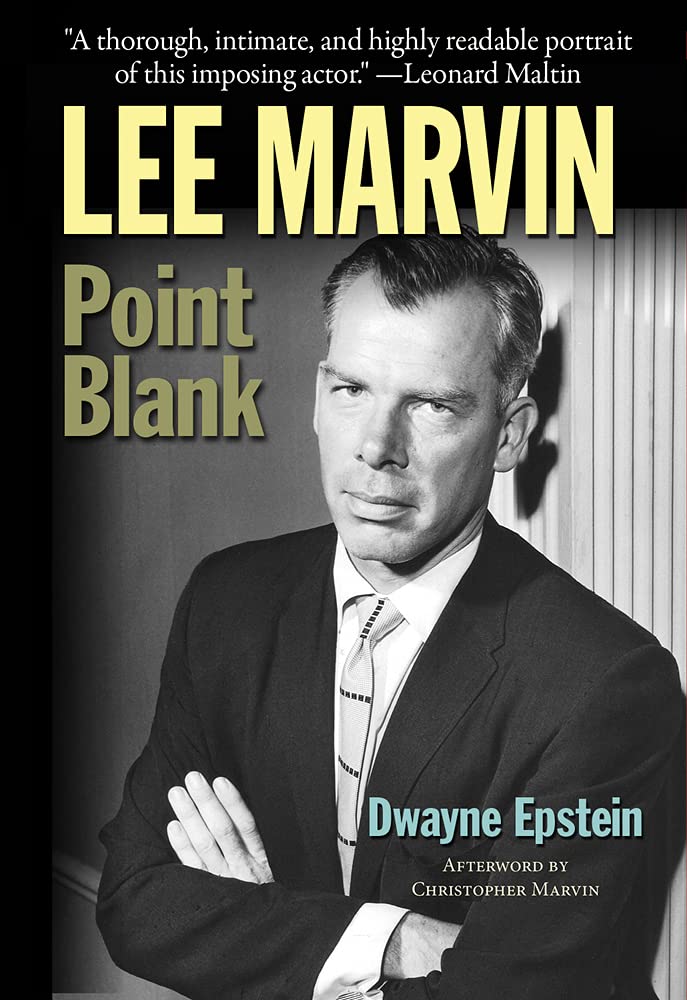
Born in New York’s Coney Island in 1960, Dwayne, has had numerous works published on film including those in a magazine I’ve been buying for many years, Filmfax Magazine. He’s written pieces on Woody Strode, Kevin McCarthy ( I had breakfast with him once), Gregory Walcott and Clint Walker among many other works. I would encourage you to follow this link for more information on Dwayne and his other writing ventures.
And on to our chat …
I for one think of Lee Marvin when the phrase “a man’s man” comes up in conversation. Whatever the phrase actually means is anyone’s guess. I do know I’ve been a fan of Lee’s since an early age discovering westerns, war films and the noir efforts which he frequented. When did you first become aware of Marvin?
Dwayne : I agree with you about the phrase “A man’s man” being rather ambiguous. As to when I first discovered Marvin, that’s kind of hard to pin down as like you, I’ve been a movie fan my entire life. I would probably have to say it was THE DIRTY DOZEN (1967) which I first saw when it aired on TV in 2-parts over to evenings back in the day and I loved it. Terrific movie top to bottom start to finish. I not only became a huge Lee Marvin fan but I was amazed by John Cassavetes, as well. Some people like to say they’ve seen a favorite film a specific number of times which I think is a waste of time. I’ve lost count a long time ago the amount of times I’ve seen THE DIRTY DOZEN and I get something from it every time I see but Marvin and Cassavetes are always a stand out a long with the rest of the cast.
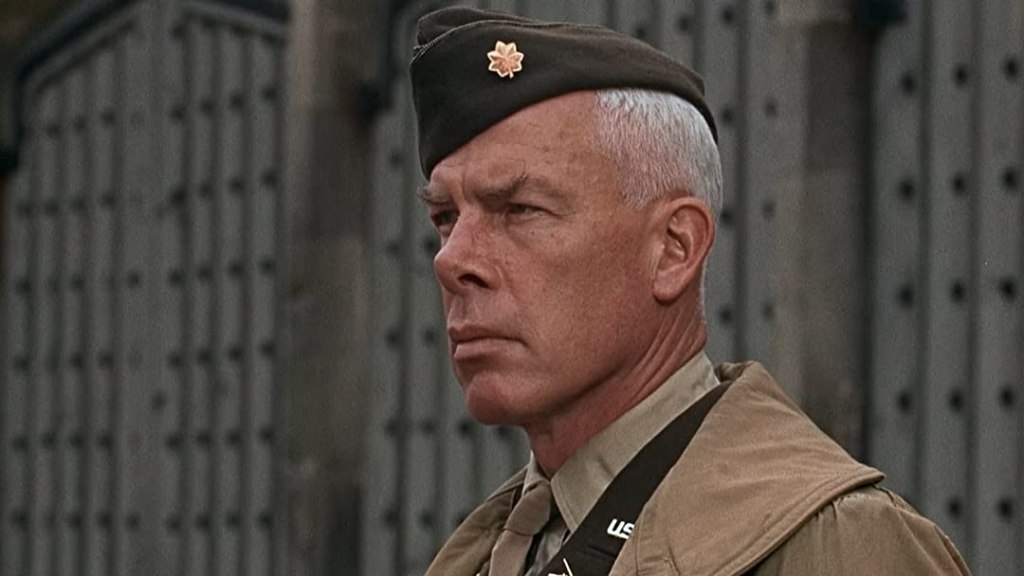
Sadly my first Lee Marvin movie on the big screen was his last, The Delta Force, in 1986. What was yours?
Dwayne : Well, I live in southern California and luckily, when I was growing up here there were a plethora of revival theaters my friends and I used to haunt. Consequently, we saw everything from THE PROFESSIONALS (1966) to THE DIRTY DOZEN and more on the big screen with an appreciative audience who were there to see classic cinema like all of us. Some of my favorite moviegoing moments were in those great old theaters. As for as films released when they first came out, I would say probably THE BIG RED ONE (1980) and I loved it!
When writing the book and focusing on his war years in the opening pages were you surprised to not only gain access to the personal letters he wrote family but the fact they still existed? Who can we thank for saving and sharing them?
Dwayne : That would be Lee’s older brother, Robert, whom I interviewed exclusively early on in my research. It took quite some convincing but he eventually opened up to me with great stories and full access to the family archives in his home in Woodstock, NY. I can’t tell you the amount of hours I spent flat on my belly in that cramped musty attic collecting all that correspondence but it sure was worth it! I always tell people I’m not Ernest Hemingway. I’ve never experienced combat myself, so I can’t really convey what it must have been like. Using Lee’s letters literally came to me at the last minute when I was working on that part of the book. I was putting off my deadline with the publisher. He kept telling me that I had to get to the war chapter. I finally realized, ‘You know what, these letters are chronological.’ In essence, I let Lee write the “I Have Had My Fill of War” chapter himself because he could say it much better than anything I could possibly come up with. Lee wrote his parents and his brother every single week, so the information was there. The hardest part was deciphering his writing, as Lee was dyslexic and he was also in the midst of battle sometimes when he would write a letter. It was often like reading hieroglyphics. A few of the letters were written while he was in a veterans’ hospital convalescing after being wounded. Those were some of the experiences that he could write about after the fact, because he couldn’t talk about them while they were going on. He wasn’t allowed to — there was a war going on! I think readers can get a pretty clear picture of those crucial years in Lee’s life. He tended to ramble, so I had to edit the letters accordingly. I tried to keep it as tight and narrative driven as possible. Without question, I think Lee did a pretty good job in telling his own story.
We now know of the existence of Post Traumatic Stress Disorder. I don’t think it’s a stretch to believe Marvin suffered through this. A quote you relayed in the book from Marvin is both harsh and revealing, “after committing murder it was hard to find sense in peace.” Did he ever seek professional help following his discharge up until his death?
Dwayne : Indeed he did, mostly at his first wife’s urging to handle his out-of-control drinking. He tried several things throughout his if but sadly, was mot very successful. Matter of fact, most PTSD victims of WWII were not even diagnosed as such until the influx of vets from the Vietnam War staring coming into the VA in massive numbers. Unfortunately, I didn’t find out until AFTER the book was published that Lee did find out and acknowledge that he did indeed suffer from PTSD. I discovered after the fact from a good friend of his I stayed on contact with over theirs.
By the time Marvin hits Hollywood he very quickly found work as a heavy in memorable films like Fritz Lang’s The Big Heat opposite Glenn Ford. Not to play spoiler to our readers but is the hot coffee scene with Gloria Grahame the meanest thing Marvin in character ever did on camera over the course of his entire career?
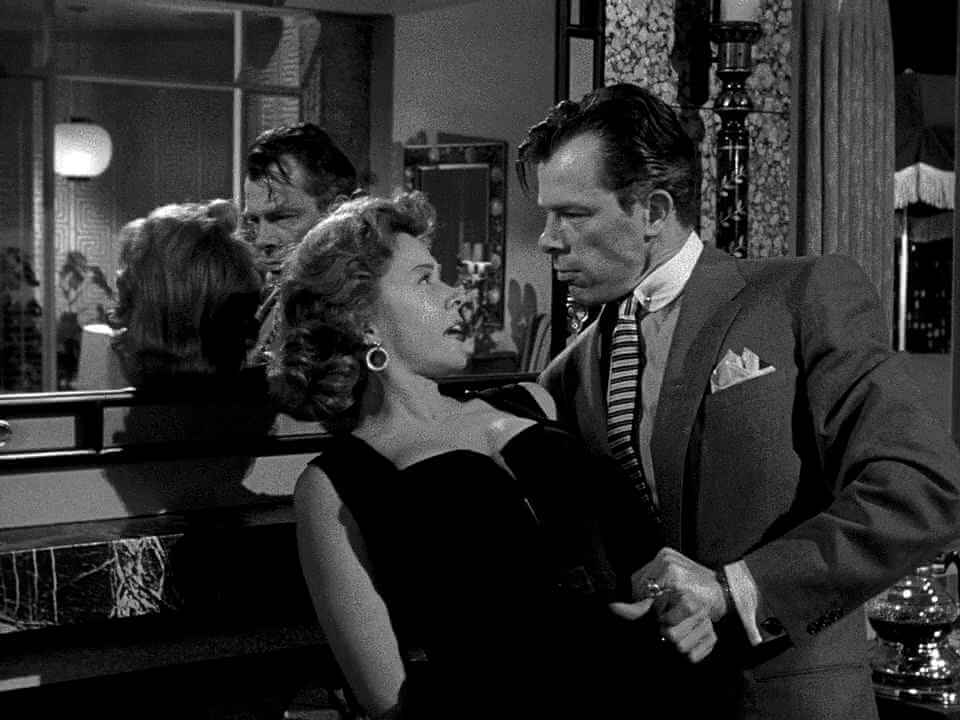
Dwayne : Interesting you picked that particular scene because when the film came out, NY Times critic Bosley Crowther dubbed Marvin “The Merchant of Menace.” So, yeah that was pretty rough, especially for the early 1950s. He stubbed his cigarette on Carolyn Jones’ hand in the same film. Naturally, because of the kind of films he made it’s hard to narrow down any one such scene as he could be pretty brutal. However, in the interest of fair play he was brutalized fairly often himself, like when Vivien Leigh beats him to unconsciousness with the heel of her shoe in SHP OF FOOLS (1965). I’ve heard that Marvin kept that shoe as a souvenir.
Throughout the fifties Marvin was co-starring alongside some big names like Bogart, Brando, Mitchum, Clift and Scott. Names we consider to be movie icons. Did he have movie heroes of his own growing up that he recalled in later years?
Dwayne : He had said in interviews that he loved action films when he was a kid, especially Errol Flynn and John Wayne. I know that Wayne and Marvin were very different men philosophically but I’m sure Marvin loved working with his childhood idol. Marvin would often comment about specific favorite films from his youth, such as ALL QUIET ON THE WESTERN FRONT (1930) and THE TREASURE OF SIERRA MADRE being two examples.
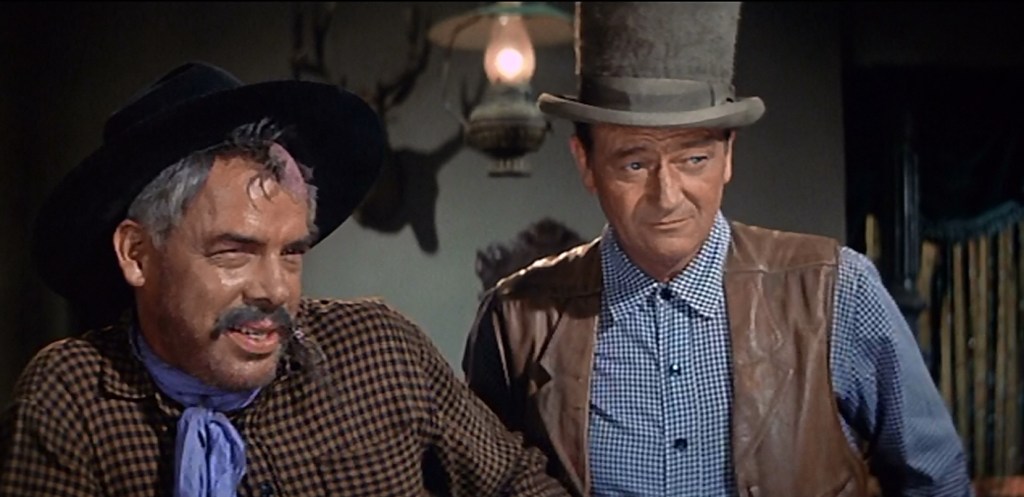
Did Lee do the impossible and steal three films from John Wayne? The Commancheros, The Man Who Shot Liberty Valance and Donovan’s Reef?
Dwayne : Definitely!
Any idea if he was intimidated by the amazing cast gathered by John Sturges for 1955’s Bad Day at Black Rock? We’re talking Spencer Tracy, Robert Ryan, Walter Brennan, Dean Jagger and another up’n comer by the name of Ernest Borgnine who was about to score an Oscar for Marty.
Dwayne : I don’t think he was necessarily intimidated by any of his costars as they were all professionals. However, I do know that if he felt that way about anybody it would be Spencer Tracy and the way he worked as an actor. Marvin was interviewed for a documentary made in the 80s called THE TRACY LEGACY in which he spoke quite impressively about what it was like to work with Tracy and he did indeed state how intimidating Tracy could be. Keep in mind, Marvin himself liked to playfully intimidate others, such as John Wayne, Jack Palance and more, which I write about in my book.

Lee co-starred with Borgnine a number of times. Surely their best movie together on equal footing was Robert Aldrich’s Emperor of the North where they waged a vicious climatic fight against each other. I’ve read that the film was a box office disappointment upon its original release but it has steadily grown as a cult hit. I’ve seen it numerous times and find it’s one of Marvin’s best roles. What’s your take on the movie?
Dwayne : Glad you asked that as it’s one of my favorites, as well. That climatic fight scene is incredible! I interviewed director of photography Joe Biroc who told me how they filmed it and it’s pretty amazing. It’s a shame the film didn’t do well when first released as I had heard it was due to confusion over the title. Luckily it has indeed been rediscovered, especially among railroad buffs.
There’s a story in the book relayed by Alvy Moore of a poker game that sees Marvin at the card table with Neville Brand, L.Q. Jones and James Garner. I don’t know if I have a meaningful question here but DAMN, don’t you just wish you could have been playing a hand at that table?
Dwayne : I wouldn’t have wanted to play against those guys but I would have liked to have been in the room and listen to the banter as they kibitzed.
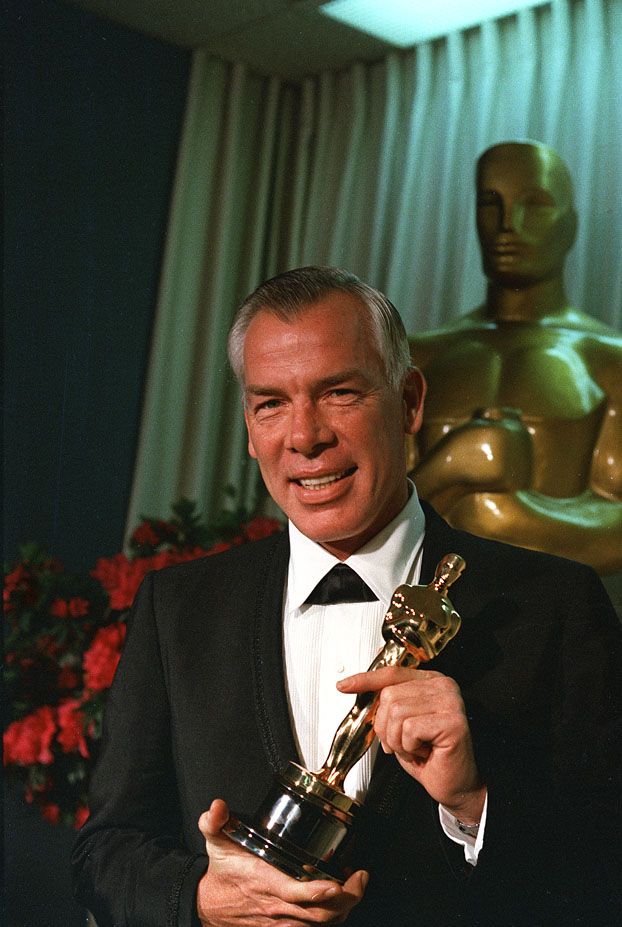
I’ll admit I haven’t seen Cat Ballou in a number of years but will add I’ve never been a fan of the film as a whole. I’m still in disbelief that Marvin scored an Oscar ahead of Rod Steiger for The Pawnbroker and Richard Burton for The Spy Who Came in From the Cold. How do you view the film and your thoughts on his winning the Oscar?
Dwayne : Believe me, no one was more surprised by the Oscar win than Marvin himself. His agent Meyer Mishkin, told me a great story about what he said to him after his name was announced which I really can’t repeat here. Suffice, to say, his Oscar victory, like some others, was not so much for his performance as it was for his body of work. I like the film, personally.
Is The Professionals grossly underrated? I find it one of the most enjoyable films of the period. The cast is to die for and the dialogue is pure magic at times yet I can’t say I ever see it make a “best western” list.
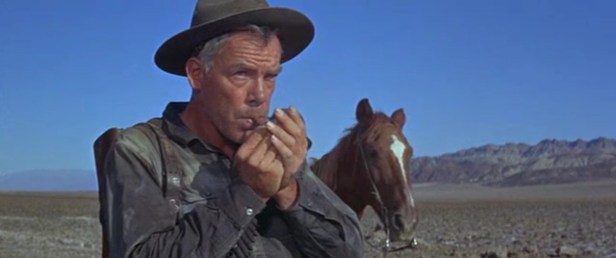
Dwayne : I agree about it being underrated which is surprising since it was quite a successful hit when first released. I never tire of it and genuinely don’t know why it’s not on any Best Western Lists. Then again, I don’t care for such lists, anyway, as the bias is blatant. One of the many things I love about that films is something Marvin said about it. Lee commented that when THE PROFESSIONALS (1966) came out, one of the things he loved about that movie was all the characters were in their 40s or older. They’re not young men, they’re not gonna see themselves as immortal, they’ve done things in their lives, and if they die, they die. They’re not gonna get up again from a bullet shot. That’s a fact. Plus it had that fabulous dialogue written by the film’s director, Richard Brooks.
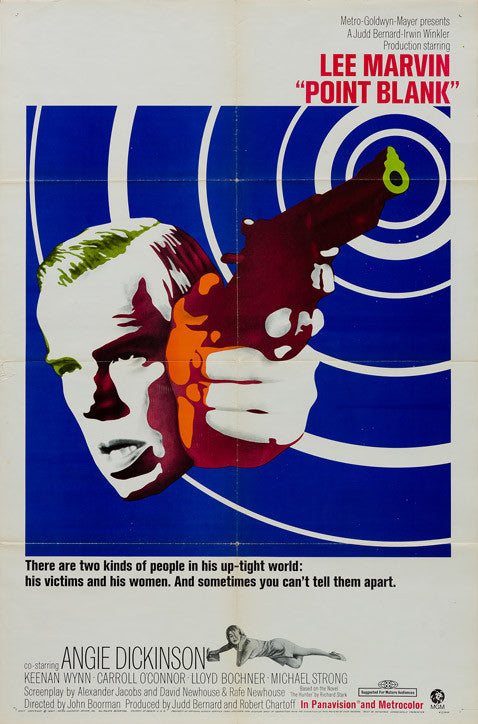
Point Blank has been remade a couple of times that I’m aware of. Three if we count the vastly different cuts of the Mel Gibson flick, Payback. Yes I enjoyed the Gibson films but where there’s Marvin there’s a danger caught on camera that is far from flashy yet keeps you on the edge of your seat. I for one believe actors like Marvin, Palance and Bronson were far more believable on camera when it came to violence than today’s muscle toned action stars. Do you agree and why do you think that is.
Dwayne : One of the things I point out whenever I can when it comes to such subject matter is the fact that actors such as Palance, Marvin, Bronson etc., were TRAINED actors, all of them. To my mind it makes a big difference in the level of believability they are capable of portraying. It’s not widely known but Bronson trained at the Pasadena Playhouse and did some early stage work. Palance replaced Brando in the stage version of “Streetcar Named Desire.” Marvin was in summer stock and Broadway early in his career. These men trod the boards and knew what they were doing. They were not someone’s martial arts instructor or limo driver who got a lucky break.
Paul Newman apparently claimed that his Slap Shot character, Reggie Dunlop, was the closest he ever played to the real Paul Newman on screen. Is there a character Lee played that may have been closer to the real life Marvin than any other?
Dwayne : I’ll answer that with an applicable quote from another film. One of my favorite films is THE ADVENTURES OF DON JUAN (1949) with Errol Flynn. His last line in the film is said to Alan Hale, Sr. in which he states, “There is a little Don Juan in every man. And since I am Don Juan, there must be more of him in me.” So, with that in mind, there is a little Lee Marvin in every one of his films.
When researching Marvin did you track down every movie and television appearance? Any standouts from his work in television? As for the movies, could you recommend to our readers an early supporting role that you found impressive?
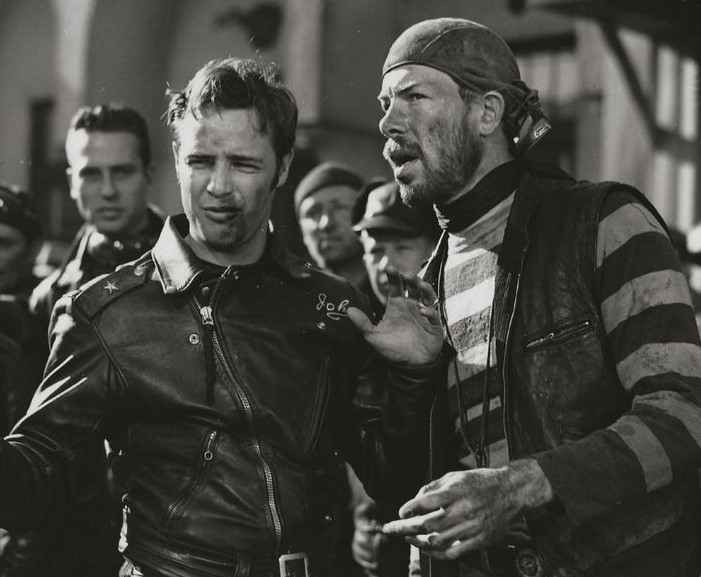
Dwayne : I would highly recommend any of his early scene-stealing roles, such as THE WILD ONE (1953) opposite Marlon Brando, or RAINTREE COUNTY (1958) opposite Montgomery Clift. Most of all, check out SHACK OUT ON 101 (1955) in which plays Slob, a short order cook in the title beanery. That film defies description! As for his TV work, he proved infinitely more versatile on TV than he ever was in film. He hated the medium but his work was outstanding. One of Lee’s all-time best performances was for a brief anthology series called NBC Sunday Showcase. He played Ira Hayes in an episode called “The American” [broadcast on March 27, 1960]. Lee would never be as poignant on film as he would be in that particular episode. “The American” focused mainly on the end of Hayes’ life, extinguished prematurely by chronic alcoholism. Hayes was a Pima Indian who helped raise the flag on Iwo Jima but could not seem to get through civilian life. As Lee said of the character at the time, Hayes could never escape being a hero. And that comes across in Lee’s brilliant performance. He just breaks your heart playing Hayes. It’s the kind of thing they just don’t do on TV anymore, unfortunately. The episode was directed by John Frankenheimer, who had worked with Lee previously on TV and then would again much later on The Iceman Cometh [1973]. Incidentally, Tony Curtis starred in the film version one year later. Released by Universal, The Outsider was an excellent, change of pace film for the handsome actor.
I did get a laugh at a quote in the book from the set of The Big Red One. When Marvin is having trouble with one line in particular, someone hollers, “get rid of this f—ing guy. Let’s get James Coburn.” Do you know how many times my wife gets the pair mixed up when I sometimes ask her teasingly who an actor is in a photo or movie I’m watching? A missed casting opportunity pairing the two on screen to be sure. On that note I like that you included a list of films that Lee was at some point connected too. Some heavy hitters in there. Any in particular you’re sorry didn’t work out knowing they turned out fine or in some cases all time classics?
Dwayne : He passed on PATTON (1970) and in truth, I’m rather glad he did as George C. Scott was incredible. The Robert Shaw role in JAWS (1975) was another blockbuster he gave thumbs down to as well which I explain in my book. Matter of fact, I have several appendices in the book on just that subject!
Put me down for a signed copy of your next project. Care to tell us a bit about it?
Dwayne : Absolutely. It’s called “Killin’ Generals: The Making of The Dirty Dozen, the Most Iconic WWII Film of All-time.”
(Yeah I’m an easy sell on this upcoming book and can’t wait to get my hands on it.)
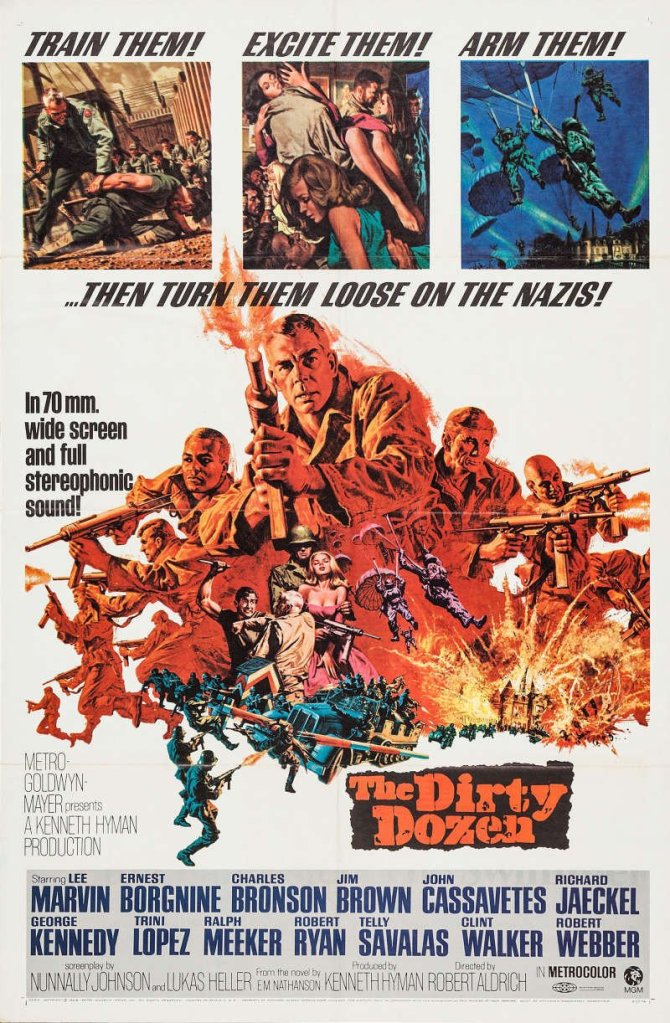
I’ll close with one of my favorite Marvin quotes from the climax of 1964’s The Killers, “Lady I don’t have the time.” ……. Would you like to sign off with one of your own?
Dwayne : Sure! Many to choose from but a personal favorite is the end dialogue between Marvin’s Rico and Ralph Bellamy’s J.W. Grant in THE PROFESSIONALS.
GRANT: You Bastard!
RICO: Yes sir. In my case, an accident of birth. But you sir, you’re a self-made man.
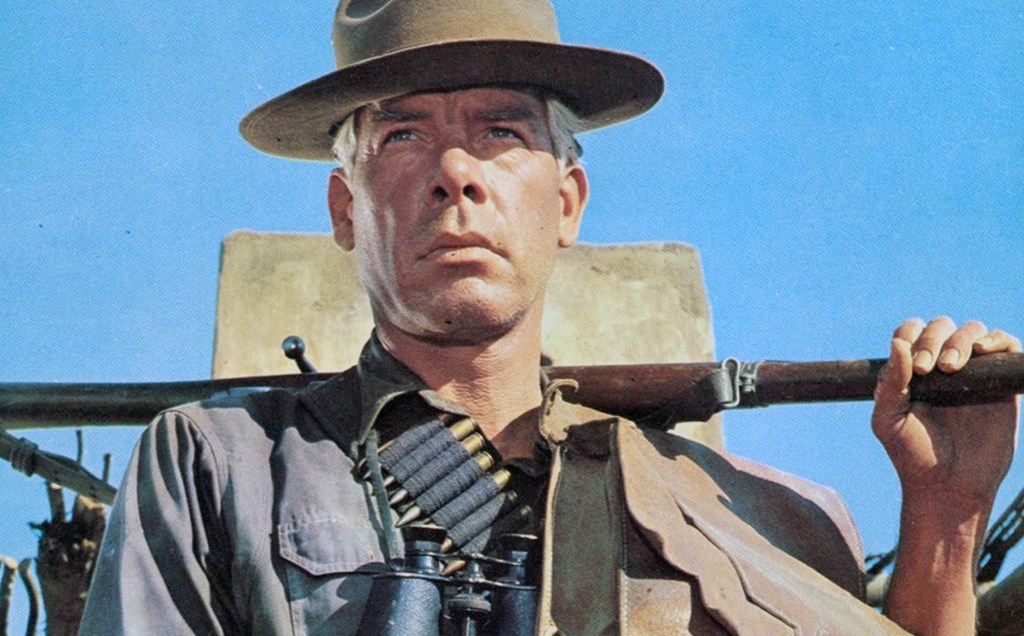
Well, if you’re still with us then I can only assume you’ll agree with Michael Madsen’s Mr. Blonde in Reservoir Dogs when he says, “Boy that was really exciting. I bet you’re a big Lee Marvin fan aren’t ya. Yeah me too. I love that guy.”
Assuming you’re also a fan be sure to grab a copy of Lee Marvin : Point Blank to learn more about this iconic actor and WW2 veteran. Not a fan? You should be so why not give this a read, watch the movies and become one like Dwayne and myself.
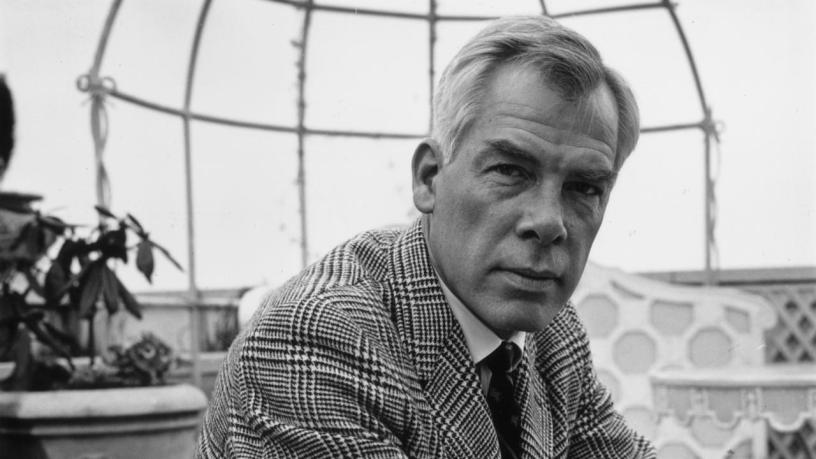
Very intriguing, cool, and informative interview Mike!!! I knew Marvin had some demons in his life, but I could never recall him saying he had PTSD in any interview he did in his later years. I do recall him admitting there was stuff he had trouble coping with, just not PTSD. My Uncle (my Dad’s brother) is also a big Lee Marvin fan.
Thanks. I suspect many men of that era had plenty of demons from the war that they carried with them for life. I’m honestly glad I can’t relate but only sympathize. I’ve heard the same about Audie Murphy his many issues he dealt with following the war and his rise in popularity on screen.
What a great interview. Many thanks to you both. I’m watching some episodes of Lee’s M Squad (1957-60). Set in Chicago whose mayor, Richard J. Daley refused cooperation as one episode had a city cop taking bribes. Marvin said: “We’d shoot locations twice a year. No permit. They didn’t want any part of us. We’d shoot and blow.”
Love Shack Out on 101.
I’ve seen a bunch of those M Squad shows, very tight and documentary style if I recall. Heaven forbid a cop be on the take. Like one of those pre-code rules we sometimes shake our heads at now.
Just ordered the paperback.
Hope you enjoy it as much as I did.
What a great interview, Mike, and I learned a lot about Marvin I’d never known before. And how cool is it that you get to interview these people…what a treat. And was that a surprise during the interview, or did you already know what his next book was going to be? Quite the revelation I’d think if you didn’t know!
And I had to check to make sure, but my first Marvin film on the big screen was ‘Death Hunt’, in 1981.
I did know what the next book was so thought I’d tee it up for him to promote. Thanks and Death Hunt! Classic but I wasn’t yet old enough as it earned the R rating here in Canada. Dad went without me. Had to wait for the VHS tape.
Note to self “Emperor of the North” needs to go on the to watch list sharpish! Not heard of that one before…
I do love Cat Ballou but hey we all know why 😉
Point Blank literally blew me away when I first saw it 30 plus years ago. A perfect film in every way for me.
Without doubt I gotta see SHACK OUT ON 101. That sounds right up my street.
Oh my days Mike you must be floating on cloud nine with that Dirty Dozen book up and coming!! Excited factor as high as the stratosphere I bet.
What another fantastic Q&A Mike. Thank you to both you and Dwayne Epstein. I thoroughly enjoyed reading that. 10/10
You are gonna thank me on Emperor. Wish I could be there to share the experience. Point Blank just so damned perfect. I did know the Dozen book was in the making and looking forward to a copy. Thanks for the kind words… after you see Emperor check out this feature I did on Borgnine playing the heavy in the film…. https://mikestakeonthemovies.com/2015/04/15/ernest-borgnine-nobody-rides-shacks-train/
Great Interview! Dwayne’s such a great guy and a wonderful writer. Lee Marvin fans unite!
Thanks! Yes indeed. Lee Marvin’s got his faithful gang still watching the films.